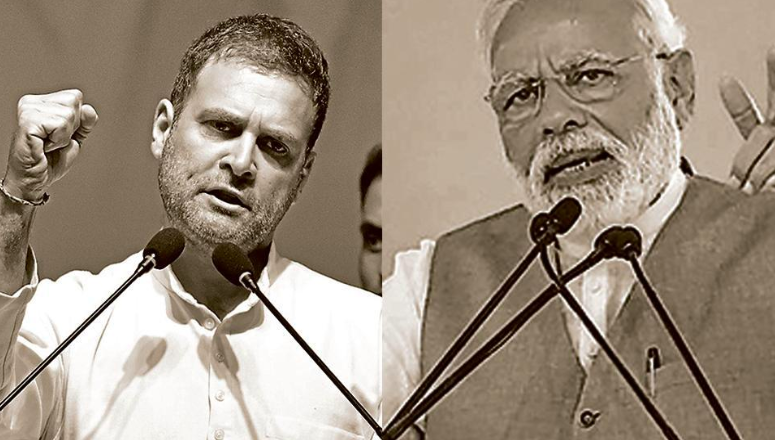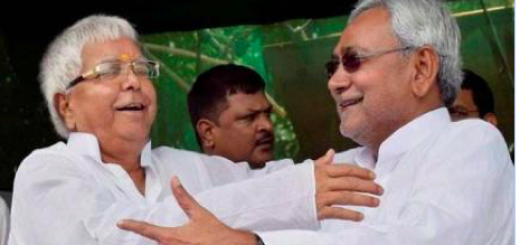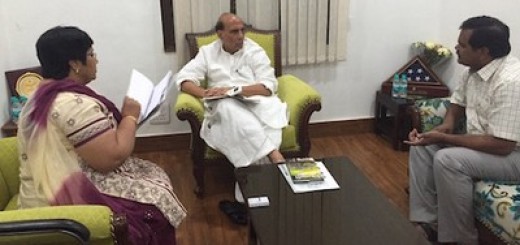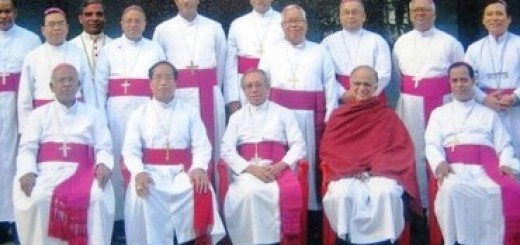No joint discussion on core issues! 2019’s two parallel election campaigns

Chanakya in Hindustan Times, Mar 30, 2019
No election is a single-issue election. And so the problem isn’t the fact that two principal sides are speaking of two different issues. The problem is they are not engaging adequately with each other on them.
For anyone observing Indian politics in general, and the Lok Sabha elections in particular, it would be clear that the two principal national parties — the Bharatiya Janata Party and the Congress — are not really debating the same issues(Sanjeev Verma/HT PHOTO)
Note: Elections are for 5 years in India and when the ruling party completes its term it should recount its achievements before the public and explain what better things they are planning for the next five years to get elected for a second term.
Where is public discussion?
The opposition parties should point out the ruling party’s main faiulures and what better programs they have to replace the ruling party. This discussion usually goes on for months for the voting public to listen and make their choice when the voting day comes.
In presidential campaigns as in US, one or two stage debates on TV which an independent jury analyses to help the public to grasp the plus and minus points of the parties contesting, also are held. Unfortunately nothings of these things happen in India.
In US & India
Even the election manifestos are not published by many although in another week the nation will start poling. So campaining in India is only to confuse people and force them to vote for the party which bribes them with money and material just before voting And the illiterate poor majority generally vote for the biggest doner, rather briber.
The BJP is projecting national security and threat from Pakistan and China and the capacity of Modi-Sha to face any odds. The Congress is highlighting 70% of the poor reeling under economic distress, farmers’ suicide, ways to help by providing minimum guarantee economic assistance and measures to protect women, dalits and Muslims from Hindutva, religious and cow protection terrorists.
Irrelevant slogan mongering
In short, both ruling and opposition parties don’t discuss same issues and expose each other. They indulge in unrelated slogan mongering, impossible promises, appealing to peoples’ fancies, not reason. If slogan shouting could win election, Rahul Gandi did it best when he said:
A ‘suit boot ki sarkar’ or a ‘chowkidar chor hai’ Sarkar can’t wipe away the country’ hymalayan problems of farm distress, unemployment, domestic terrorism, religious divisions and fanatic promotion of Hindutva and Muslim bashing. Nor can it help Congress reduced to 44 MPs in 2014 get additional MPs anywhere.
Lucky dip result?
Election campaign so far has literally muddied country’s atmosphere with their unrelated shouting that the voters are driven crazy whom to vote in or out. Still they will vote, but for the last sound bite that impresses them, not for a considered candidate. They will be acting as they do in a lucky dip. Only after counting the last vote we will know who the winner is. james kottoor, Editor CCV.
Please read below election analysis in Hindustan Times
If you go by theory of representative democracy, elections provide an opportunity for a robust debate on principles that should guide the governance of the nation; policies that should be introduced or not; measures that should be taken to ensure security of life, liberty and property; and reforms that ought to be brought in to make lives better for all.
Different political parties have different visions; they campaign on their respective platforms; they disagree and debate; and then it is up to the voter to decide which platform appeals top them the most. The party which is able to sell its ideas most effectively is elected, vested with power to frame laws and execute those policies, subject to constitutional restraints.
Now compare it to practice.
For anyone observing Indian politics in general, and the Lok Sabha elections in particular, it would be clear that the two principal national parties — the Bharatiya Janata Party (BJP) and the Congress — are not really debating the same issues. They are in fact running two parallel campaigns, and avoiding, as far as possible, getting into the terms of the campaign of the other side. What we have thus is almost two different elections, being fought in two different echo chambers, leaving the voters deprived of their right to a solid, informed debate.
How did we get here?
After the outcome of the state elections at the end of last year, the BJP recognised that it had a battle on its hands. It was clearly confronting anti-incumbency. The central government’s economic policies, particularly demonetisation and the roll out of the Goods and Services Tax, had caused disruption and alienated people. Joblessness was a real concern. And the agrarian distress, reflected in the dip in farmer incomes, was real. The party’s claims on rural welfare helped, but were not enough.
It was in this backdrop that the Pulwama terror attack and the retaliatory Balakot strikes happened. The BJP’s primary campaign plank in this election then turned to national security. Prime Minister Narendra Modi’s campaign speeches in the last three days have focused on how India has finally the decisive leadership in place to take on terror emanating from Pakistan. His script is as follows: earlier governments were weak and cowardly; the era of restraint is over; if India is hit, India will enter Pakistani territory, and hit back (“with interest”); India is secure because he is PM; the opposition on the other hand is tacitly aligned with Pakistan, terrorists and anti national forces, and thus, the citizens must vote him back to power.There is an entirely different campaign on the ground as well.
The Congress was jubilant after the state elections, and felt it had found a winning formula with its focus on unemployment and agrarian distress. Then came Pulwama — and the party struggled with a response. Supporting the government would help Modi claim credit; questioning it too much was not on in times of national crisis. Almost paralysed for three weeks, the Congress seemed to have lost its way.
And then it went back to the promise party president Rahul Gandhi had made right before the budget in Chhattisgarh — of ensuring a minimum income guarantee to the poorest Indians. It fleshed out the details and announced that 20% of India’s poorest households, 50 million of them, would get ₹6,000 every month. Termed the NYAY scheme, Congress finally rediscovered its vocabulary. Gandhi went on the offensive, accused the PM of backing crony capitalists even as the Congress was with the poor of the country.
No election is a single-issue election. And so the problem isn’t the fact that two principal sides are speaking of two different issues. The problem is they are not engaging adequately with each other on them. The BJP’s campaign strategists have decided that national security, and rural welfare in terms of asset creation, is the core message. They avoid, as far as possible, getting into specifics of the debate on unemployment figures of farm incomes for this is an area of vulnerability. The Congress’ campaign strategists have decided that pro-poor welfare is the core message. They avoid, as far as possible, getting into the realm of national security and Pakistan policy.
Both sides are avoiding playing on each other’s turf. What should ideally have happened is this. The Congress needed to get into the national security debate, ask questions, and respond to them too. It should have explained its restraint after Mumbai attacks; asked why despite the surgical strikes, terror attacks and trouble in Kashmir had not ceased; what was the government’s plan if another such attack happened; was India prepared for a prolonged conflict; and offered another roadmap to deal with terror attacks.
At the same time, the BJP should have got into the debate on unemployment and agrarian distress. It suffers a real crisis of credibility in terms of numbers and date. So it was up to the party to convince the electorate that reports had not been buried; provide credible explanations, not spin, on the sectors where jobs have been created. It should have answered specific questions on why farm protests have been a recurring feature; how it squares taking such pride in low food inflation with its commitment to increasing agricultural incomes; and what it has done and will do for other sectors which provide rural non-agricultural employment.
The two parties respond to each other on these issues at a tactical level. But in terms of the big messages from the big leaders, and the campaigns by their propaganda machines, they stick to their own narratives. In the process, India is witnessing two campaigns — and till the twain meet, we will neither have a consensus on national security nor on the road ahead in terms of welfare and economy.

















Telegraph columnist Sankarshan Thakur on April 3/2019 writes:
"When the horrific mosque massacres in New Zealand left the world numbed, nothing stirred the prime minister, Narendra Modi, to take to Twitter and express the mildest grief; he had the foreign office fax a letter to his New Zealand counterpart instead. His Twitter timeline, his chief messaging tool to his constituency, wouldn’t be sullied by expressions of remorse for victims slaughtered while at prayer in a mosque.
"Days later, when it transpired that several of those killed were of Indian origin, the tragedy drew a meditated silence; no anguish for that lot. It was a silence for the Modishirts to hear and take note of. Bigotry employed as tool of ballot bonanza. It was also a low shot as any other; the unfortunate thing is there may be, among us, sanction and applause for it." Do you feel good or bad? Whichever the feeling, Why?
All the poltical parties who are in the election fray, must come on the national television for a debate on their election promises. First each party must present its election manifesto, then there should be a debate on the issues.
The debates should be recorded / archived so that no leader worth his/her salt can get away in future by denying his/her point / rhetorics on the Television.
Also people / some experts should be allowed to question the leaders. The questions shold be impromptu / live and should not be sent in advance to the leaders or moderator.